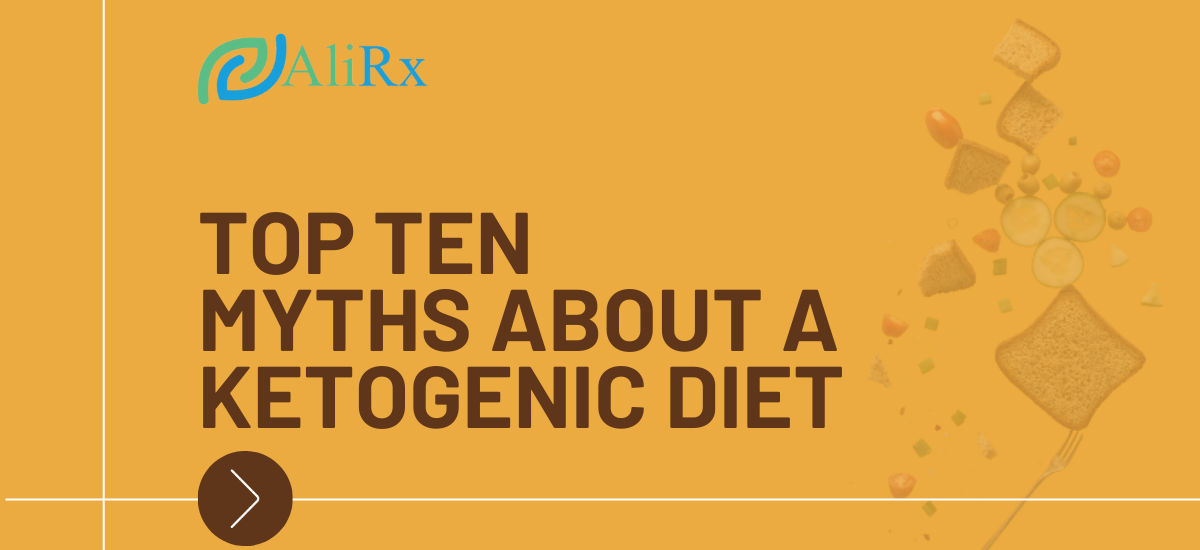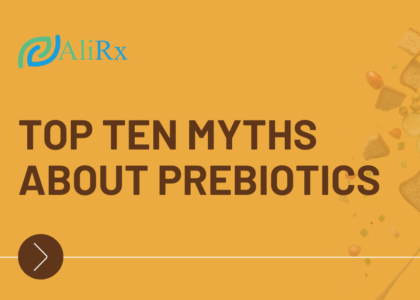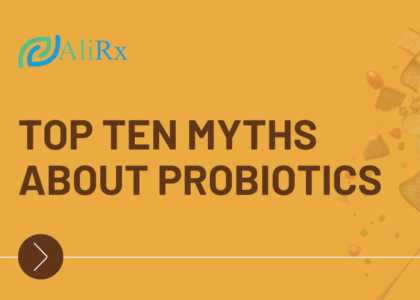The top ten myths about a ketogenic diet
The ketogenic diet is a popular diet focusing on reducing carbohydrate intake and replacing it with healthy fats. However, as in any diet, there are many myths related to the ketogenic diet. In this article, we’ll debunk the top ten myths and most common fallacies about this diet and provide the facts about what it really is and how it works.
Myth #1: The ketogenic diet is just another fad diet.

Some people may believe that the ketogenic diet is just another fad diet. Why? For some, it seems like a drastic change from the typical American diet while others are intimidated because of the significant reduction in carbohydrate intake and an increase in fat consumption that it requires. Are you one of those who think it’s just a trend that will pass? Did you know that the ketogenic diet is a scientifically-backed dietary strategy and is not just a passing fad?
FACT: The ketogenic diet has been used for over 90 years, primarily as a therapeutic treatment for epilepsy. In recent years, it has gained popularity as a weight loss and health promoting diet.
Source: National Institute of Health (NIH), “The Ketogenic Diet: Uses in Epilepsy and Other Neurologic Illnesses”, https://www.ncbi.nlm.nih.gov/pmc/articles/PMC3826507/
Myth #2: A ketogenic diet is high in protein.
Just because the ketogenic diet is often associated with high-protein diets such as the Atkins diet doesn’t mean it is all protein. In fact, the ketogenic diet’s main focus is to reduce carbohydrate intake so that they are replaced with healthy fats. Therefore, while the ketogenic diet still includes some protein, the majority of the calories come from fat and not protein.
FACT: A well-formulated ketogenic diet is moderate in protein, and primarily composed of healthy fats and low-carbohydrate foods.
Source: National Institute of Health (NIH), “Ketogenic Diet for Weight Loss: Benefits, Risks, and How to Follow”, https://www.ncbi.nlm.nih.gov/pmc/articles/PMC6356343/
Myth #3: You can’t eat any carbohydrates on a ketogenic diet.

Although the ketogenic diet does limit the intake of carbohydrates to about 5-10% of total caloric intake, some carbs are allowed, such as non-starchy vegetables and nuts. Health professionals, dietitians, and nutritionists typically recognize this myth and advise against this restrictive approach of completely eliminating carbohydrates.
FACT: While a ketogenic diet is very low in carbohydrates, it allows for a small amount of non-starchy, low-carbohydrate vegetables such as leafy greens.
Source: National Institute of Health (NIH), “Ketogenic Diet for Weight Loss: Benefits, Risks, and How to Follow”, https://www.ncbi.nlm.nih.gov/pmc/articles/PMC6356343/
Myth #4: The ketogenic diet is unsafe and causes long-term health problems.
Why do some people think the ketogenic diet is unsafe? Often, they are only misinformed about the risks associated with it and do not understand the importance of properly managing electrolyte levels. Some people tiptoe around this diet thinking it’s too restrictive or difficult to maintain. Others think that the lack of carbohydrates can be harmful to the body; however, the body can actually adjust to burning fat for energy.
FACT: When followed correctly, the ketogenic diet can be a safe and effective way to improve overall health, as long as it is carefully monitored by a healthcare provider.
Source: National Institute of Health (NIH), “Ketogenic Diet for Weight Loss: Benefits, Risks, and How to Follow”, https://www.ncbi.nlm.nih.gov/pmc/articles/PMC6356343/
Myth #5: You can’t exercise on a ketogenic diet.

The reasoning behind this myth comes from thinking that the lack of carbohydrates will not provide enough energy for any physical activity. This is far from the truth. Ketones can actually provide an alternative and efficient source of energy for the body which helps during exercise. Consequently, exercise helps boost energy levels, improves body composition, and promotes overall health.
FACT: Exercise is highly recommended on a ketogenic diet, and can even enhance the benefits of the diet, as long as it is properly fueled with sufficient fat and protein.
Source: National Institute of Health (NIH), “Ketogenic Diet for Weight Loss: Benefits, Risks, and How to Follow”, https://www.ncbi.nlm.nih.gov/pmc/articles/PMC6356343/
Myth #6: The ketogenic diet is too restrictive and hard to stick to.
Nowadays, there are many delicious and healthy recipes that can make it easier for you to stay on track if you’re on a ketogenic diet. Believing this diet is restrictive limits you to the endless possibilities of its health benefits. Go ahead and see for yourself how possible and sustainable it is to create and enjoy keto-friendly meals with enough planning and preparation.
FACT: The ketogenic diet can be very satisfying and filling, and there are many delicious food options to choose from.
Source: National Institute of Health (NIH), “Ketogenic Diet for Weight Loss: Benefits, Risks, and How to Follow”, https://www.ncbi.nlm.nih.gov/pmc/articles/PMC6356343/
Myth #7: A ketogenic diet is only for weight loss.

Just like in myth # 5, if you think that a ketogenic diet is only for weight loss, it’s because you probably think it is only a low-carb diet. Again, ketones (not just carbohydrates) provide an alternative and efficient source of energy for the body. Thus, a ketogenic diet can help improve overall health, not just promote weight loss.
FACT: While weight loss is a common benefit of the ketogenic diet, it can also improve other health markers such as blood sugar control, cardiovascular health, and brain function.
Source: National Institute of Health (NIH), “Ketogenic Diet for Weight Loss: Benefits, Risks, and How to Follow”, https://www.ncbi.nlm.nih.gov/pmc/articles/PMC6356343/
Myth #8: The ketogenic diet is bad for your cholesterol levels.
This myth may stem from the fact that some ketogenic diets contain high levels of saturated fat, often linked to high cholesterol levels. However, research has shown that this is not necessarily the case. Many studies have proven that a ketogenic diet can actually improve cholesterol levels especially when done correctly. Moreover, a ketogenic diet can lead to improved health markers, such as lower triglycerides and improved insulin sensitivity.
FACT: While some people may experience temporary changes in their cholesterol levels on the ketogenic diet, it has been shown to improve cholesterol markers in the long-term, as long as it is combined with a healthy, whole food-based diet.
Source: National Institute of Health (NIH), “Ketogenic Diet for Weight Loss: Benefits, Risks, and How to Follow”, https://www.ncbi.nlm.nih.gov/pmc/articles/PMC6356343/
Myth #9: You can eat as much fat as you want on a ketogenic diet.
Many people assume that a ketogenic diet is very high in fat which leads them to believe they can eat as much fat as they want. However, this is not true, because, as in any diet, the ketogenic diet should be balanced and well-formulated so you’ll be properly nourished. That way, you can have the right amounts of healthy fats, proteins, and carbohydrates in your body, too. Did you know that eating too much fat can lead to weight gain? Therefore, it defeats the whole purpose of a ketogenic diet if that is the case.
FACT: While a ketogenic diet is high in fat, it’s important to choose healthy fats from sources such as avocados, coconut oil, and nuts, and to limit unhealthy fats from sources such as processed and fast foods.
Source: National Institute of Health (NIH), “Ketogenic Diet for Weight Loss: Benefits, Risks, and How to Follow”, https://www.ncbi.nlm.nih.gov/pmc/articles/PMC6356343/
Myth #10: The ketogenic diet is only for men.
For some, the ketogenic diet is intimidating and extreme so it must only be for men who have the body type and can stick to its strict requirements. However, this is not true, as the ketogenic diet can be beneficial for any gender – men and women alike. Additionally, you can tailor a ketogenic diet to meet your individual needs so that it can be a viable choice for everyone.
FACT: The ketogenic diet can be beneficial for both men and women, although women may need to adjust their macronutrient ratios slightly to accommodate their unique hormonal needs.
Source: National Institute of Health (NIH), “Ketogenic Diet for Weight Loss: Benefits, Risks, and How to Follow”, https://www.ncbi.nlm.nih.gov/pmc/articles/PMC6356343/
In conclusion, no matter what diet you get into, it’s important to always consult with a healthcare provider. It’s important that you get professional medical advice before starting a new health regimen, including the ketogenic diet.





